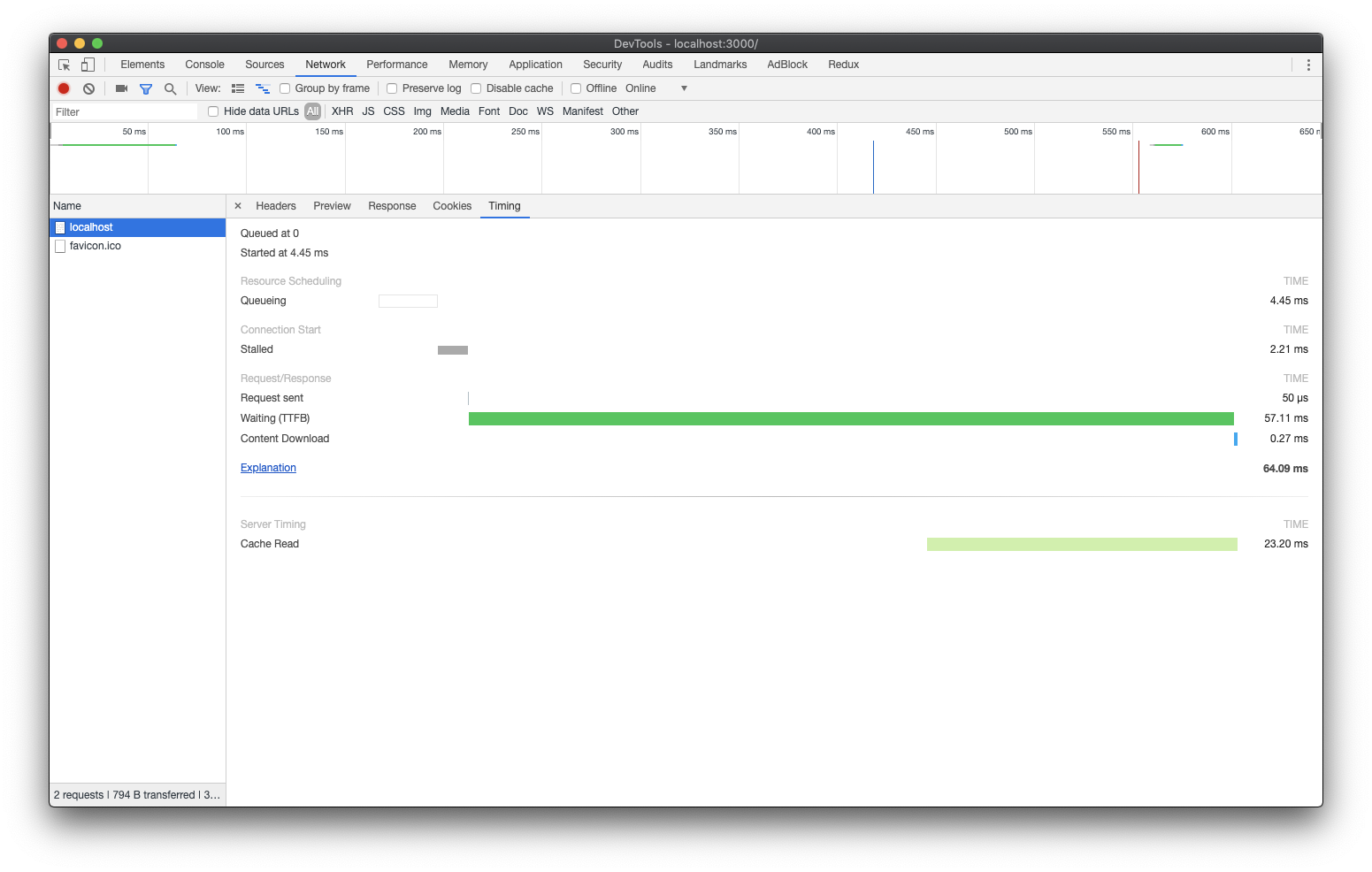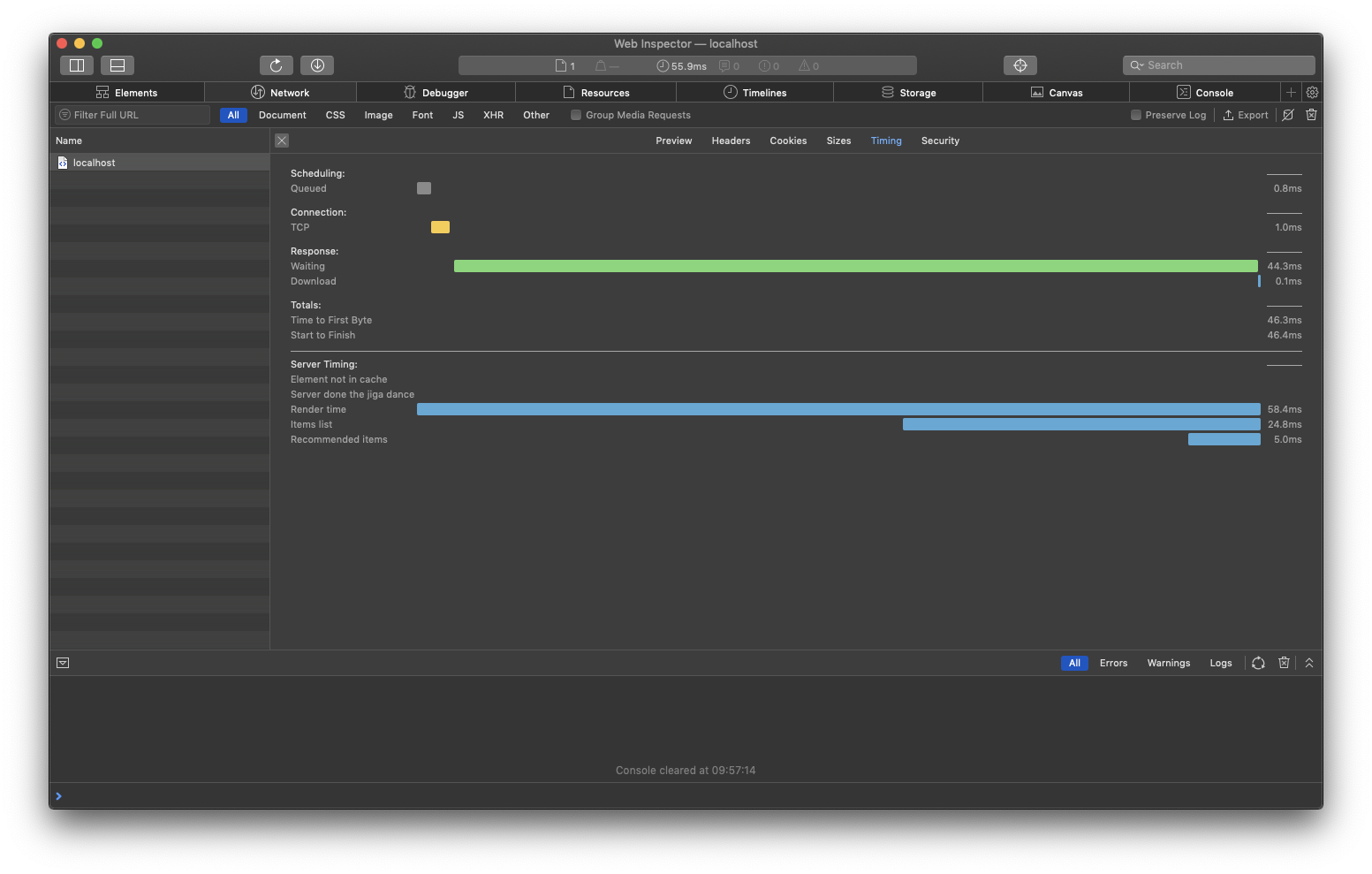Server-Timing Header
This is middleware for Express that allow you monitor server-side performance in the browser with use of Service-Timing headers.
- Great for identifying server-side performance issues.
- Supported in Chrome, Safari and Mozilla.
- 1.52 KB with all dependencies, minified and gzipped.
- Tested.
Usage
Step 1: install package.
npm i -S server-timing-headerStep 2: add middleware.
```diff javascript
const serverTimingMiddleware = require('server-timing-header'); const express = require('express'); const app = express();
app.use(serverTimingMiddleware({sendHeaders: (process.env.NODE_ENV !== 'production')})); ```
Step 3: measure how long take to get data.
```diff javascript app.get('/', function (req, res, next) {
- req.serverTiming.from('db'); // fetching data from database
- req.serverTiming.to('db'); // … }); ```
Step 4: check Server-Timing in the network tab of Chrome DevTools.

Examples
javascript
const express = require('express');
const serverTimingMiddleware = require('server-timing-header');
const port = 3000;
const app = express();
app.use(serverTimingMiddleware({sendHeaders: (process.env.NODE_ENV !== 'production')}));
app.get('/', function (req, res, next) {
req.serverTiming.from('db');
// fetching data from database
req.serverTiming.to('db');
});
app.listen(port, () => console.log(`Example app listening on port ${port}!`));
javascript
const express = require('express');
const serverTimingMiddleware = require('server-timing-header');
const port = 3000;
const app = express();
app.use(serverTimingMiddleware());
app.get('/', function (req, res, next) {
// You got time metric from the external source
req.serverTiming.add('cache', 'Cache Read', 23.2);
});
app.listen(port, () => console.log(`Example app listening on port ${port}!`));
javascript
const express = require('express');
const serverTimingMiddleware = require('server-timing-header');
const port = 3000;
const app = express();
app.use(serverTimingMiddleware());
app.get('/', function (req, res, next) {
req.serverTiming.from('render');
req.serverTiming.from('data');
// fetching data from database
req.serverTiming.to('data');
req.serverTiming.to('render');
});
app.use(function (req, res, next) {
// If one measurement include other inside you may substract times
req.serverTiming.addHook('substractDataTimeFromRenderTime', function (metrics) {
const updated = { ...metrics };
if (updated.data && updated.render) {
const renderDuration = req.serverTiming.calculateDurationSmart(updated.render);
const dataDuration = req.serverTiming.calculateDurationSmart(updated.data);
updated.render.duration = Math.abs(renderDuration - dataDuration);
}
return updated;
});
});
app.listen(port, () => console.log(`Example app listening on port ${port}!`));


javascript
['navigation', 'resource']
.forEach(function(entryType) {
performance.getEntriesByType(entryType).forEach(function({name: url, serverTiming}) {
serverTiming.forEach(function({name, duration, description}) {
console.info('expressjs middleware =',
JSON.stringify({url, entryType, name, duration, description}, null, 2))
})
})
})

Support
- Chrome v.60
- FF v.63
- Safari v.12.1 (no api support)
Documentation
Table of Contents
ServerTiming
Middleware for express.js to add Server Timing headers
Meta
- author: Anton Nemtsev <thesilentimp@gmail.com>
addHook
Add callback to modify data before create and send headers
Parameters
namestring — hook namecallbackfunction — function that may modify data before send headerscallbackIndexnumber index that will be used to sort callbacks before execution
Examples
Add hook to mutate the metrics
const express = require('express');
const serverTimingMiddleware = require('server-timing-header');
const port = 3000;
const app = express();
app.use(serverTimingMiddleware());
app.use(function (req, res, next) {
// If one measurement include other inside you may substract times
req.serverTiming.addHook('substractDataTimeFromRenderTime', function (metrics) {
const updated = { ...metrics };
if (updated.data && updated.render) {
const renderDuration = req.serverTiming.calculateDurationSmart(updated.render);
const dataDuration = req.serverTiming.calculateDurationSmart(updated.data);
updated.render.duration = Math.abs(renderDuration - dataDuration);
}
return updated;
});
});
app.listen(port, () => console.log(`Example app listening on port ${port}!`));removeHook
Remove callback with specific name
Parameters
namestring — hook name
from
Set start time for metric
Parameters
Examples
You may define only start time for metric
const express = require('express');
const serverTimingMiddleware = require('server-timing-header');
const port = 3000;
const app = express();
app.use(serverTimingMiddleware());
app.get('/', function (req, res, next) {
// If you define only start time for metric,
// then as the end time will be used header sent time
req.serverTiming.from('metric', 'metric description');
// fetching data from database
});
app.listen(port, () => console.log(`Example app listening on port ${port}!`));to
Set end time for metric
Parameters
Examples
You may define only end time for metric
const express = require('express');
const serverTimingMiddleware = require('server-timing-header');
const port = 3000;
const app = express();
app.use(serverTimingMiddleware());
app.get('/', function (req, res, next) {
// fetching data from database
// If you define only end time for metric,
// then as the start time will be used middleware initialization time
req.serverTiming.to('metric');
});
app.listen(port, () => console.log(`Example app listening on port ${port}!`));description
Add description to specific metric
Parameters
duration
Add duration to specific metric
Parameters
namestring — metric namedurationfloat — duration of the metric
add
Add metric
Parameters
namestring metric namedescriptionstring — metric descriptiondurationnumber — metric duration (optional, default0.0)
Examples
Add metric
const express = require('express');
const serverTimingMiddleware = require('server-timing-header');
const port = 3000;
const app = express();
app.use(serverTimingMiddleware());
app.get('/', function (req, res, next) {
// You got time metric from the external source
req.serverTiming.add('metric', 'metric description', 52.3);
});
app.listen(port, () => console.log(`Example app listening on port ${port}!`));calculateDurationSmart
Calculate duration between two timestamps, if from or two is undefined — will use initialization time and current time to replace
Parameters
metricobject — object that contain metric informationmetric.namestring — metric namemetric.descriptionstring — metric descriptionmetric.fromArray<integer> — start time [seconds, nanoseconds], if undefined, initialization time will be usedmetric.toArray<integer> — end time [seconds, nanoseconds], if undefined, current timestamp will be usedmetric.durationinteger — time in milliseconds, if not undefined method will just return durations
Returns integer duration in milliseconds
oldStyle
Build server-timing header value by old specification
Parameters
Returns string — server-timing header value
newStyle
Build server-timing header value by current specification
Parameters
Returns string — server-timing header value
index
Express middleware add serverTiming to request and make sure that we will send this headers before express finish request
Parameters
optionsobject? — middleware options (optional, default{})options.sendHeadersboolean? should middleware send headers (may be disabled for some environments) (optional, defaulttrue)
Examples
How to add middleware
const express = require('express');
const serverTimingMiddleware = require('server-timing-header');
const port = 3000;
const app = express();
app.use(serverTimingMiddleware());
app.get('/', function (req, res, next) {
req.serverTiming.from('db');
// fetching data from database
req.serverTiming.to('db');
});
app.listen(port, () => console.log(`Example app listening on port ${port}!`));Returns function return express middleware